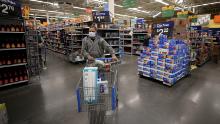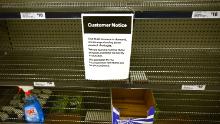Stores cap purchases of toilet paper and masks amid panic buying over the coronavirus
Australian supermarket chains Woolworths and Coles both began limiting toilet paper purchases to four packs per person this week. Costco Australia is also restricting how much toilet tissue, disinfectant, milk, eggs and rice each customer can buy.
In the United Kingdom, Boots is limiting the purchase of hand sanitizer to two bottles per customer, and UK online grocer Ocado has advised customers to place orders further in advance in the wake of “exceptionally high demand.”
Emergency food service providers — which send freeze dried meals to people preparing for crises such as natural disasters — are also experiencing a huge surge in sales.
“We’re doing approximately our average monthly orders in a day,” said James Blake, chief of Emergency Food Storage UK, the largest emergency food supplier in Europe. “Our tins have a 25-year shelf life so people are really thinking about stocking up.”
Panic at the supermarket
At a Coles supermarket in Brisbane, Australia on Wednesday, toilet paper was completely sold out. One worker at the store told CNN Business that his shift had been hectic as customers mobbed the aisles.
When a new delivery of toilet rolls arrived that afternoon, workers didn’t even have time to unpack the goods before shoppers swooped in, he said.
Things were so frantic that workers simply handed packs straight to customers, the employee added. He said he didn’t want to be named because he wasn’t authorized to speak to media.
“It’s crazy,” one customer muttered after spotting empty shelves at the store.
“Insane,” another person said.
In a statement to CNN Business, Coles said that the security deployment was “a one-off” situation.
Stretched supply chains
Patrick Noone, managing director of Costco Australia, said his team has been scrambling to adjust to the sudden jump in demand over the last few days.
“We have seen an influx of people in warehouses across the country in the past week ‘stocking up,'” Noone said in a statement. “Our employees and suppliers are working tirelessly to try and keep up.”
“The fear of facing increasing supply shortages and prospects of disruptions to daily life have likely prompted people to stock up,” Bernard Aw, a principal economist at IHS Markit, told CNN Business.
But he added that “businesses generally prefer stable demand growth as opposed to any spikes because of the impact [that] such surges in demand will have on their capacity to ensure sufficient supplies.”
Some retailers have also been thrown off by disruption on the back end.
To work around these hiccups, some businesses are adopting new practices.
Coles has introduced “some direct ‘supplier to store’ deliveries” to simplify the supply chain, a spokesperson said.
This is “to speed up how quickly we’re able to replenish popular items like toilet paper,” the company told CNN Business.
Jonathan Cheng, a partner at Bain who leads the company’s retail practice in Greater China, said the crisis underscored a need for some traditional retailers to rethink how they source and provide goods in the long term.
“Retail management teams are currently facing two looming challenges. The first is a logistical bottleneck,” he noted. “The second challenge is imminent supply shortages, linked to uncertainty about when factories will resume production.”
“They are adept at managing disruption and moving sourcing from one country to another to mitigate any impact,” he told CNN Business. “Our members are working as hard as they can to ensure consumers have access to whatever products they want.”
— CNN’s Hilary Whiteman, Hanna Ziady, Eoin McSweeney and Emma Reynolds contributed to this report.


